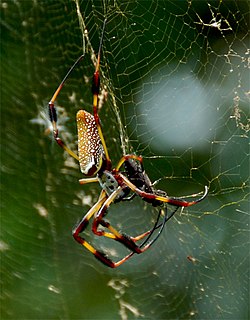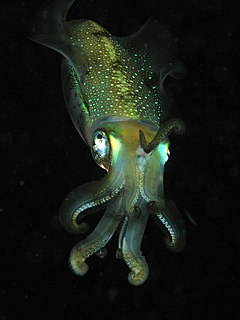 W
WArachnology is the scientific study of spiders and related animals such as scorpions, pseudoscorpions, and harvestmen, collectively called arachnids. Those who study spiders and other arachnids are arachnologists. More narrowly, the study of spiders alone is known as araneology.
 W
WArthropodology is a biological discipline concerned with the study of arthropods, a phylum of animals that include the insects, arachnids, crustaceans and others that are characterized by the possession of jointed limbs.
 W
WBatrachology is the branch of zoology concerned with the study of amphibians including frogs and toads, salamanders, newts, and caecilians. It is a sub-discipline of herpetology, which includes also non-avian reptiles. Batrachologists may study the evolution, ecology, ethology, or anatomy of amphibians.
 W
WConchology is the study of mollusc shells. Conchology is one aspect of malacology, the study of molluscs; however, malacology is the study of molluscs as whole organisms, whereas conchology is confined to the study of their shells. It includes the study of land and freshwater mollusc shells as well as seashells and extends to the study of a gastropod's operculum.
 W
WEthology is the scientific and objective study of animal behaviour, usually with a focus on behaviour under natural conditions, and viewing behaviour as an evolutionarily adaptive trait. Behaviourism as a term also describes the scientific and objective study of animal behaviour, usually referring to measured responses to stimuli or to trained behavioural responses in a laboratory context, without a particular emphasis on evolutionary adaptivity. Throughout history, different naturalists have studied aspects of animal behaviour. Ethology has its scientific roots in the work of Charles Darwin (1809-1882) and of American and German ornithologists of the late 19th and early 20th century, including Charles O. Whitman, Oskar Heinroth (1871-1945), and Wallace Craig. The modern discipline of ethology is generally considered to have begun during the 1930s with the work of Dutch biologist Nikolaas Tinbergen (1907-1988) and of Austrian biologists Konrad Lorenz and Karl von Frisch (1886-1982), the three recipients of the 1973 Nobel Prize in Physiology or Medicine. Ethology combines laboratory and field science, with a strong relation to some other disciplines such as neuroanatomy, ecology, and evolutionary biology. Ethologists typically show interest in a behavioural process rather than in a particular animal group, and often study one type of behaviour, such as aggression, in a number of unrelated species.
 W
WHelminthology is the study of parasitic worms (helminths). The field studies the taxonomy of helminths and their effects on their hosts.
 W
WHerpetology is the branch of zoology concerned with the study of amphibians and reptiles. Birds, which are cladistically included within Reptilia, are traditionally excluded here; the scientific study of birds is the subject of ornithology.
 W
WIchthyology is the branch of zoology devoted to the study of fish, including bony fish (Osteichthyes), cartilaginous fish (Chondrichthyes), and jawless fish (Agnatha). According to FishBase, 33,400 species of fish had been described as of October 2016, with approximately 250 new species described each year.
 W
WMalacology is the branch of invertebrate zoology that deals with the study of the Mollusca, the second-largest phylum of animals in terms of described species after the arthropods. Mollusks include snails and slugs, clams, octopuses and squid, and numerous other kinds, many of which have shells. One division of malacology, conchology, is devoted to the study of mollusk shells. Malacology derives from Greek μαλακός, malakos, "soft"; and -λογία, -logia.
 W
WIn zoology, mammalogy is the study of mammals – a class of vertebrates with characteristics such as homeothermic metabolism, fur, four-chambered hearts, and complex nervous systems. Mammalogy has also been known as "mastology," "theriology," and "therology." The archive of number of mammals on earth is constantly growing, but is currently set at 6,495 different mammal species including recently extinct. There are 5,416 living mammals identified on earth and roughly 1,251 have been newly discovered since 2006. The major branches of mammalogy include natural history, taxonomy and systematics, anatomy and physiology, ethology, ecology, and management and control. The approximate salary of a mammalogist varies from $20,000 to $60,000 a year, depending on their experience. Mammalogists are typically involved in activities such as conducting research, managing personnel, and writing proposals.
 W
WMarine biology is the scientific study of marine life, organisms in the sea. Given that in biology many phyla, families and genera have some species that live in the sea and others that live on land, marine biology classifies species based on the environment rather than on taxonomy.
 W
WNematology is the scientific discipline concerned with the study of nematodes, or roundworms. Although nematological investigation dates back to the days of Aristotle or even earlier, nematology as an independent discipline has its recognizable beginnings in the mid to late 19th century.
 W
WOrnithology is a branch of zoology that concerns the "methodological study and consequent knowledge of birds with all that relates to them". Several aspects of ornithology differ from related disciplines, due partly to the high visibility and the aesthetic appeal of birds. It has also been an area with a large contribution made by amateurs in terms of time, resources, and financial support. Studies on birds have helped develop key concepts in biology including evolution, behaviour and ecology such as the definition of species, the process of speciation, instinct, learning, ecological niches, guilds, island biogeography, phylogeography, and conservation. While early ornithology was principally concerned with descriptions and distributions of species, ornithologists today seek answers to very specific questions, often using birds as models to test hypotheses or predictions based on theories. Most modern biological theories apply across life forms, and the number of scientists who identify themselves as "ornithologists" has therefore declined. A wide range of tools and techniques are used in ornithology, both inside the laboratory and out in the field, and innovations are constantly made.
 W
WPalaeozoology, also spelled as Paleozoology, is the branch of paleontology, paleobiology, or zoology dealing with the recovery and identification of multicellular animal remains from geological contexts, and the use of these fossils in the reconstruction of prehistoric environments and ancient ecosystems.
 W
WPlanktology is the study of plankton, various small drifting plants, animals and microorganisms that inhabit bodies of water. Planktology topics include primary production, energy flow and the carbon cycle.
 W
WSociobiology is a field of biology that aims to examine and explain social behavior in terms of evolution. It draws from disciplines including psychology, ethology, anthropology, evolution, zoology, archaeology, and population genetics. Within the study of human societies, sociobiology is closely allied to evolutionary anthropology, human behavioral ecology and evolutionary psychology.